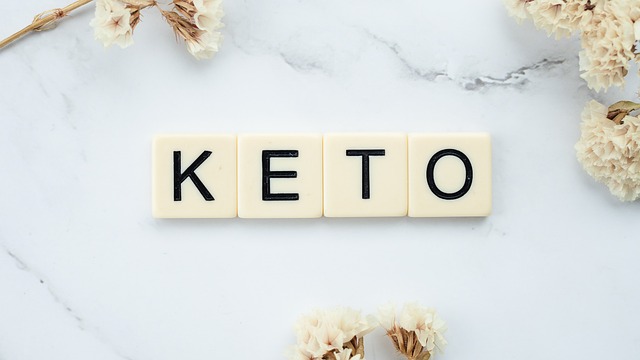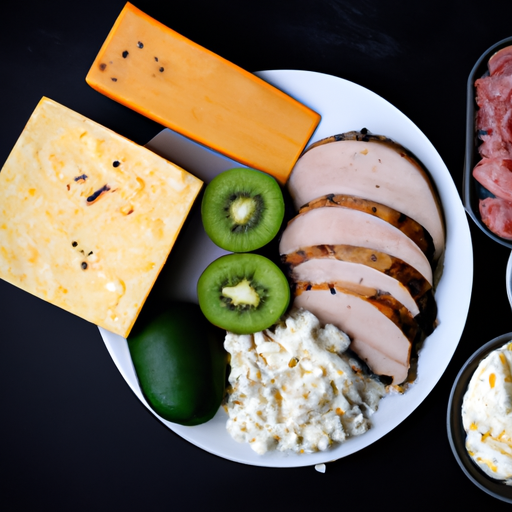Are you someone who has been struggling to lose weight? Have you heard about the Keto diet and wondered if it could be the solution you’re looking for? Well, you’re in luck because in this article, we’ll be diving into the topic of whether or not the Keto diet can actually help with weight loss. We’ll explore what the diet entails, how it works, and what scientific research says about its effectiveness. So if you’re curious to learn more about whether or not the Keto diet is worth a try, keep reading!
If you’ve been contemplating trying out the Keto diet as a tool for weight loss, you’re definitely not alone. It’s been gaining popularity in recent years, with many people claiming that it’s helped them shed those stubborn pounds. But is there any truth to these claims? Can the Keto diet really help you lose weight? Well, you’ll find out everything you need to know in this article. We’ll dig deep into the science behind this diet, looking at its effects on the body and the potential benefits and drawbacks of following it. So if you’re curious to know if the Keto diet is a viable option for weight loss, keep reading and get ready to have all your questions answered!
What is the Keto Diet?
Definition of the Keto Diet
The Keto Diet, also known as the ketogenic diet, is a low-carb, high-fat diet that has gained popularity in recent years. It focuses on drastically reducing carbohydrate intake and replacing it with fats. By doing so, the body enters a state of ketosis, where it burns fat for energy instead of relying on carbohydrates.
How the Keto Diet Works
When you limit your carbohydrate intake to a very low level, your body starts to break down stored fat into molecules called ketones. These ketones are then used as an alternative source of fuel, providing energy to your body and brain. This metabolic state of ketosis is what makes the Keto Diet unique and can have a significant impact on weight loss.
Benefits of the Keto Diet
Weight Loss
One of the primary reasons people turn to the Keto Diet is its effectiveness in promoting weight loss. By restricting carbohydrates and increasing fat intake, your body is forced to use stored fat as its main source of fuel. This can lead to substantial weight loss, especially during the initial phase of the diet.
Increased Energy
Many individuals following the Keto Diet report feeling more energized and focused throughout the day. This is because ketones provide a more stable and consistent source of energy than carbohydrates, which can lead to energy crashes and fluctuations.
Improved Mental Focus
The Keto Diet has been shown to enhance cognitive function and improve mental clarity. By eliminating the spikes and crashes in blood sugar levels associated with high-carbohydrate diets, you can experience increased mental clarity and focus.
Reduced Inflammation
High levels of carbohydrates in the diet can contribute to inflammation in the body. By reducing carbohydrate intake and increasing healthy fats, the Keto Diet may help reduce inflammation and its associated symptoms, such as joint pain and swelling.
Controlled Blood Sugar Levels
The Keto Diet can also help regulate blood sugar levels, making it particularly beneficial for individuals with diabetes or insulin resistance. By minimizing carbohydrate intake, the diet can help stabilize blood glucose levels and prevent spikes and crashes.

Are You a Ketosis Master? Take Our Quiz!
How Does the Keto Diet Aid in Weight Loss?
Promotes Ketosis
The primary mechanism through which the Keto Diet aids in weight loss is by promoting ketosis. When the body is in a state of ketosis, it is constantly burning fat for energy, leading to weight loss over time.
Reduces Carb Intake
By significantly reducing carbohydrate intake, the Keto Diet limits the body’s main source of fuel. This forces the body to rely on stored fat for energy, leading to weight loss.
Increases Fat Burning
The Keto Diet stimulates fat burning by increasing the consumption of healthy fats. These fats are broken down into ketones, which are then used as fuel for the body. Increasing fat intake can enhance the body’s ability to burn stored fat for energy.
Suppresses Appetite
The high fat and moderate protein content of the Keto Diet can help suppress appetite and reduce cravings. This can make it easier to adhere to a reduced-calorie diet, ultimately leading to weight loss.
Potential Risks and Side Effects
Keto Flu
As your body adjusts to the Keto Diet, you may experience what is commonly known as the “keto flu.” This can include symptoms such as fatigue, headaches, nausea, and brain fog. However, these side effects are typically temporary and can be managed through proper hydration and electrolyte balance.
Nutrient Deficiencies
Following the Keto Diet may result in nutrient deficiencies if not carefully planned and monitored. Since the diet restricts many food groups, such as fruits, whole grains, and legumes, it is important to ensure you are obtaining all essential vitamins and minerals through other sources or supplements.
Digestive Issues
Some individuals may experience digestive issues when first starting the Keto Diet, such as constipation or diarrhea. This can be due to the drastic change in diet and can usually be managed by increasing fiber intake and staying hydrated.
Increased Cholesterol Levels
The Keto Diet is high in saturated fats, which may lead to an increase in LDL cholesterol levels for some individuals. However, it is essential to note that the impact on cholesterol levels can vary from person to person, and some studies have shown that the diet can improve cholesterol profiles.
Risk of Kidney Stones
The Keto Diet can increase the risk of kidney stones due to the higher intake of animal proteins and limited fruit and vegetable consumption. This risk can be minimized by maintaining proper hydration and ensuring a well-balanced diet.

How to Follow the Keto Diet
Calculating Macros
To follow the Keto Diet, it is essential to calculate your macronutrient ratios. Typically, the diet consists of consuming 70-75% of calories from fat, 20-25% from protein, and 5-10% from carbohydrates.
Choosing Keto-Friendly Foods
To adhere to the Keto Diet, focus on consuming foods that are low in carbohydrates but high in healthy fats. This includes foods such as avocados, nuts and seeds, olive oil, fatty fish, and low-carb vegetables.
Meal Planning and Preparing
Meal planning and preparation are critical when following the Keto Diet. This allows you to ensure you are consuming the right balance of macronutrients and helps prevent impulsive food choices that may not align with the diet.
Combining the Keto Diet with Exercise
Types of Exercise
Incorporating exercise into your Keto Diet regimen can enhance weight loss and overall health. Focus on a combination of cardiovascular exercise, such as jogging or cycling, and strength training exercises to build lean muscle mass.
Optimal Exercise Timing
The timing of your workouts can also play a role in maximizing the benefits of the Keto Diet. Some individuals find that exercising in a fasted state, such as in the morning before breakfast, can further promote fat burning.
Adapting to Exercise on Keto
It is important to note that it may take some time for your body to adjust to exercising on a Keto Diet. You may initially experience a decrease in performance due to the limited glycogen stores in your muscles. However, as your body becomes more efficient at utilizing fat for energy, you will likely see improvements in endurance and performance.

Success Stories and Testimonials
Real-Life Experiences
Many individuals have had success with the Keto Diet and have shared their experiences of significant weight loss and improved overall well-being. These testimonials can provide motivation and inspiration for those considering the diet.
Before and After Transformations
Before and after photos are often shared by individuals who have achieved impressive weight loss with the Keto Diet. These visual representations can showcase the potential results and serve as examples of what can be achieved.
Expert Opinions on the Keto Diet
Research and Studies
There is a growing body of research supporting the effectiveness of the Keto Diet for weight loss. Many studies have shown that individuals on a low-carb, high-fat diet tend to lose more weight compared to those on a traditional low-fat diet.
Medical Professional Perspectives
Medical professionals have differing opinions on the Keto Diet and its potential benefits and risks. It is essential to consult with a healthcare provider or registered dietitian before starting any new diet plan, especially if you have pre-existing medical conditions.

Common Misconceptions About the Keto Diet
Unlimited Fat Consumption
While the Keto Diet does emphasize consuming healthy fats, it is not a free pass to consume unlimited amounts of them. Portion control is still important, as consuming excess calories from fats can impede weight loss.
No Need for Exercise
Although weight loss can still occur on the Keto Diet without exercise, incorporating regular physical activity can enhance the results and contribute to overall health and well-being.
No Carbs Allowed
While the Keto Diet restricts carbohydrates, it does not mean that all carbohydrates are off-limits. It is possible to include low-carb fruits, vegetables, and whole grains in moderation while still maintaining ketosis.
Conclusion
Effectiveness of the Keto Diet for Weight Loss
The Keto Diet can be an effective tool for weight loss, primarily due to its ability to promote ketosis and utilize stored fat for energy. However, it is essential to consider individual factors, such as health status and lifestyle preferences, and personalize the diet accordingly.
Considerations and Personalization
As with any diet, it is crucial to approach the Keto Diet with caution and take into account individual circumstances and goals. Consulting with a healthcare professional or registered dietitian can help ensure that the diet is appropriate and tailored to your specific needs.
In conclusion, the Keto Diet has shown promising results in terms of weight loss and overall health improvements. By following the guidelines and personalizing the diet to fit your needs, you can potentially experience the benefits of ketosis and achieve your weight loss goals.
